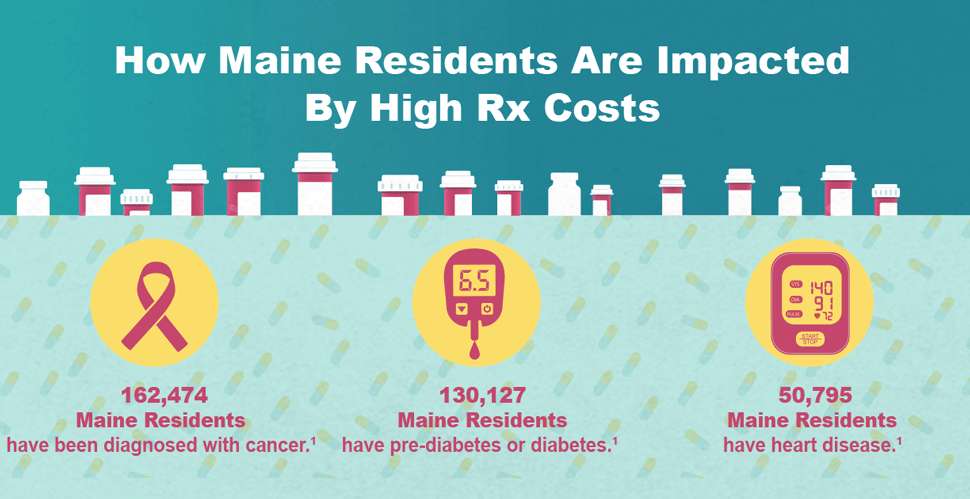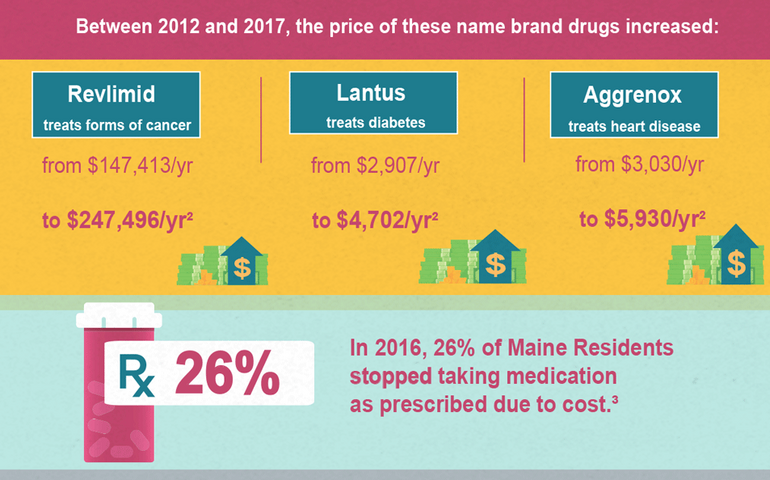
Processing Your Payment
Please do not leave this page until complete. This can take a few moments.
- News
-
Editions
View Digital Editions
Biweekly Issues
- December 1, 2025
- Nov. 17, 2025
- November 03, 2025
- October 20, 2025
- October 6, 2025
- September 22, 2025
- + More
Special Editions
- Lists
- Viewpoints
-
Our Events
Event Info
Award Honorees
- Calendar
- Biz Marketplace
Mainers hit hard by rising prescription drug prices, AARP data show
 Courtesy / AARP Maine
Courtesy / AARP Maine
One out of four Mainers (26%) stopped taking their prescribed medications in 2017 because of costs, according to data published by AARP Maine on Wednesday.
The statistic is part of an infographic that shows how Mainers are affected by rising prescription drug prices, and which was released at the National Academy for State Health Policy annual conference in Chicago.
The event brought together more than 850 leaders from throughout the country to explore state policy responses to rising drug and health care costs, the opioid epidemic and other pressing topics.
AARP released new information about Maine as part of the organization's nationwide Stop RX Greed campaign to lower drug prices for all Americans.
The two-part infographic shows the number of residents diagnosed with cancer, pre-diabetes or diabetes and who have heart disease, along with retail prices for key medications for treating those conditions.

From 2012-2017, the retail price for cancer drug Revlimid increased in Maine from $147,713 a year to $247,976; Lantus, a form of insulin used to treat diabetes, went up from $2,907 a year to $4,702 a year; and Aggrenox, a heart disease medication, nearly doubled in annual costs from $3,030 to $5,930.
"While prescription drugs continue skyrocketing, Americans are forced to choose between filling life-saving medications or paying rent and buying food," AARP Maine State Director Lori Parham said in a news release. "So far in 2019, 29 states have passed 46 new laws to rein in drug prices. It's critical that state and federal lawmakers continue this momentum to stop Rx greed."
AARP Maine said it had worked with Maine lawmakers during the past legislative session to pass bills that will lower prices and improve accessibility to medications for Mainers.
"Maine is once again leading the way, but now we need members of Congress to follow that lead," Parham said, calling on the state's U.S. senators to "work with their colleagues to pass bipartisan federal legislation to lower prescription medication prices across the country."
Mainebiz web partners

The Giving Guide
The Giving Guide helps nonprofits have the opportunity to showcase and differentiate their organizations so that businesses better understand how they can contribute to a nonprofit’s mission and work.
Learn More
Work for ME
Work for ME is a workforce development tool to help Maine’s employers target Maine’s emerging workforce. Work for ME highlights each industry, its impact on Maine’s economy, the jobs available to entry-level workers, the training and education needed to get a career started.
Learn More
Groundbreaking Maine
Whether you’re a developer, financer, architect, or industry enthusiast, Groundbreaking Maine is crafted to be your go-to source for valuable insights in Maine’s real estate and construction community.
Learn more-
The Giving Guide
The Giving Guide helps nonprofits have the opportunity to showcase and differentiate their organizations so that businesses better understand how they can contribute to a nonprofit’s mission and work.
-
Work for ME
Work for ME is a workforce development tool to help Maine’s employers target Maine’s emerging workforce. Work for ME highlights each industry, its impact on Maine’s economy, the jobs available to entry-level workers, the training and education needed to get a career started.
-
Groundbreaking Maine
Whether you’re a developer, financer, architect, or industry enthusiast, Groundbreaking Maine is crafted to be your go-to source for valuable insights in Maine’s real estate and construction community.
ABOUT
NEW ENGLAND BUSINESS MEDIA SITES
No articles left
Get access now
In order to use this feature, we need some information from you. You can also login or register for a free account.
By clicking submit you are agreeing to our cookie usage and Privacy Policy
Already have an account? Login
Already have an account? Login
Want to create an account? Register
Get access now
In order to use this feature, we need some information from you. You can also login or register for a free account.
By clicking submit you are agreeing to our cookie usage and Privacy Policy
Already have an account? Login
Already have an account? Login
Want to create an account? Register






0 Comments